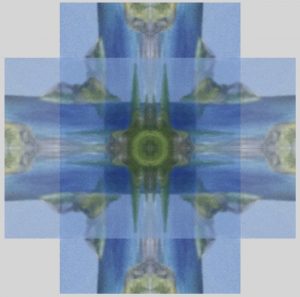If withdrawal into liminal space (symbolized by the stay on a Greek island in The Alexandria Quartet) is a journey to the underworld or — to put it less mystically — an immersion in what comes out of the unconscious, then we might expect curious effects connected to the passing of time. This is what the narrator refers to when he says “once you become aware of the operation of a time which is not calendar-time you become in some sort a ghost” (667).

1. The timelessness of the unconscious is already a principal observation of Freud’s:
Wir haben erfahren, daß die unbewußten Seelenvorgänge an sich »zeitlos« sind. Das heißt zunächst, daß sie nicht zeitlich geordnet werden, daß die Zeit nichts an ihnen verändert, daß man die Zeitvorstellung nicht an sie heranbringen kann. Es sind dies negative Charaktere, die man sich nur durch Vergleichung mit den bewußten seelischen Prozessen deutlich machen kann. Unsere abstrakte Zeitvorstellung scheint vielmehr durchaus von der Arbeitsweise des Systems W-Bw hergeholt zu sein und einer Selbstwahrnehmung derselben zu entsprechen.
Sigmund Freud. Sämtliche Werke, 238.
This passage is from “Jenseits des Lustprinzips” (1920), and what is called calendar-time in the literary quote above, Freud here calls “our abstract notion of time” and assigns it to the workings of our systems of perception and consciousness (“System W-Bw”). We become aware of calendar-time through self-observation: when we observe the conscious processes in our psychology.
Similarly, in “Das Unbewußte” (1915):
Die Vorgänge des Systems Ubw sind zeitlos, d. h., sie sind nicht zeitlich geordnet, werden durch die verlaufende Zeit nicht abgeändert, haben überhaupt keine Beziehung zur Zeit. Auch die Zeitbeziehung ist an die Arbeit des Bw-Systems geknüpft.
Sigmund Freud, Sämtliche Werke, 146-147.
2. But note that this idea of the “timelessness of the unconscious” could be understood in multiple ways. Freud cites two more or less clear ones (impossibility of temporal ordering, and invariance over time), and then subsumes the rest under the rather vague formulation “have no relation to time”, or “one cannot apply the idea of time to them”.
The first one, where the focus is on temporal ordering, is frequently taken up by Jung as a common premise from the analytical tradition, e.g. in The Psychology of Transference, where he contextualizes the impossibility of temporal ordering of both the alchemistic stages of the opus and of the individuation process with reference to that tenet of the analytical tradition:
Das zeitliche Nacheinander der Phasen des opus ist eine sehr unsichere Sache. Wir begegnen derselben Unsicherheit auch beim Individuationsprozeß, wo man eine typische Abfolge der Stufen nur ganz im allgemeinen konstruieren kann. Der tiefere Grund für diese “Unordnung” ist wohl die “Zeitlosigkeit” des Unbewußten, indem das bewußte Nacheinander dort ein Beieinander, ein Zugleichsein ist.
GW XIV, § 468n10.
(These stages, i.e. “Stufen”, are what I have referred to as Jung’s progression on this blog.) What appears in consciousness as temporally ordered (as “Nacheinander”) must be assumed to not have this order on the unconscious level; or more precisely, those contents which break into conscious awareness may get coordinated in the temporal system, i.e. sorted into before/after relationships, only on the conscious level; we infer that there are unconscious processes which generated them, but there is no indication that we can assume them to have a before/after ordering on that unconscious level, too: the ordering appears only on the conscious level.
The second one is famously at the base of the early psychotherapeutic approaches in the analytical tradition. Experiences, especially intense and painful ones which repeat over and over again without allowing escape, seemed to be at the root of psychological problems, an idea (in early psychoanalysis) which Wollheim (much later) summed up as the “tyranny of the past”:
Mental illness is [according to Freud’s early views] due to the excessive influence of past events, and past events acquire an excessive influence through the incorruptibility of memories that recall them.
Richard Wollheim, The Thread of Life, 132.
That incorruptibility, of course, is exactly what Freud, in the quotes above, refers to when he says that the unconscious processes “werden durch die verlaufende Zeit nicht abgeändert”, or, more unpacked:
An event occurs, and what normally happens to memories — that is, they are abreacted or flushed away in the attendant emotion, or they are swept up into some network of associations, or they are simply forgotten — does not happen in this particular case. On the contrary, the memory survives as if fixed in ambergris.
Ibd.
3. Now the problem is that “ghost-time”, as understood by Durrell’s narrator, is neither of these two, more or less clearly explicated, ideas of the “timelessness of the unconscious”.
Ghost-time, for to Durrell’s narrator, is different from calendar-time because he “could hear the echoes of words uttered long since in the past by other voices” (667), and learned “to inhabit those deserted spaces which time misses — beginning to live between the ticks of the clock, so to speak.” (659)
But there is no question about the ordering of events in terms of what comes before or after what. And there is no question of eternal, unchanged repetition, either. (Although the form we found earlier in DeLillo might fit that idea more closely.) And apart from these, Freud’s claims are not actually of much help here — for what does it mean that the unconscious “has no relation to time at all”?



